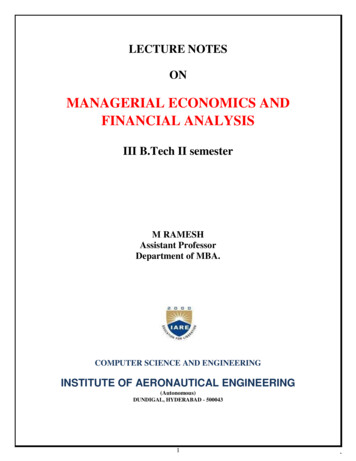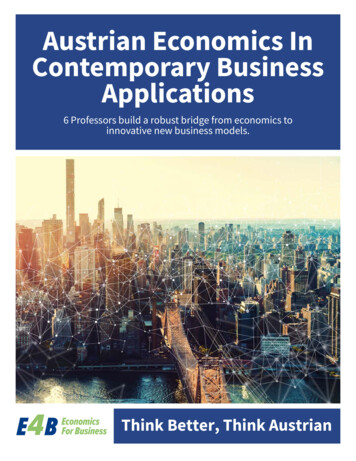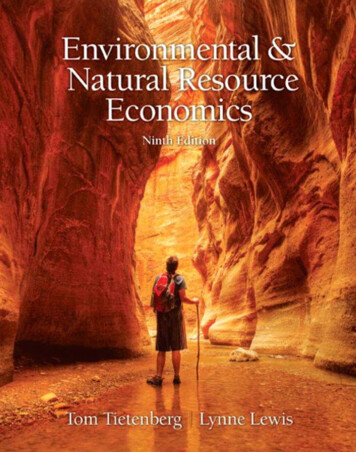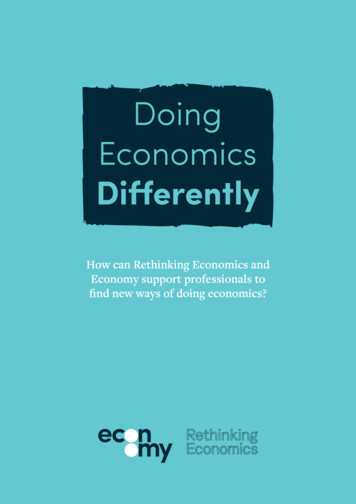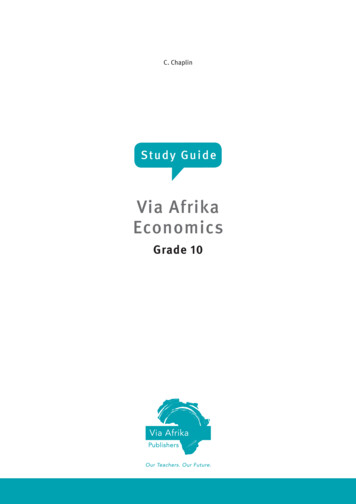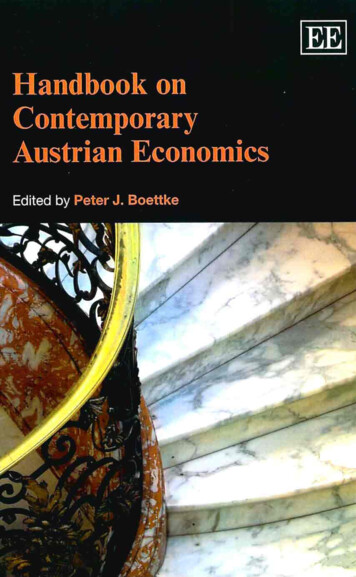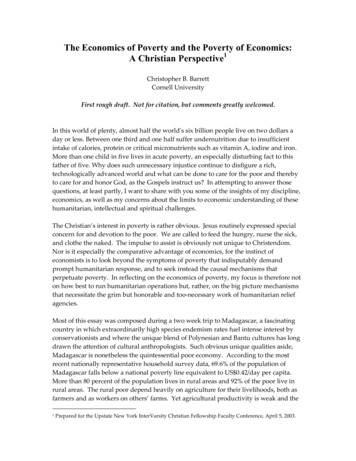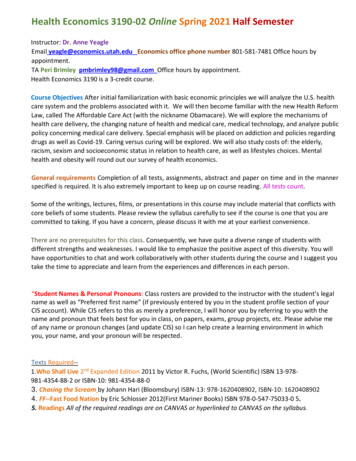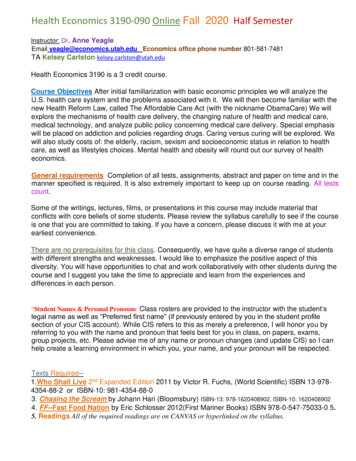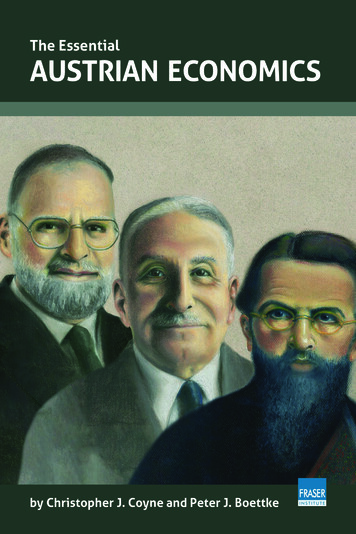
Transcription
The EssentialAUSTRIAN ECONOMICSby Christopher J. Coyne and Peter J. Boettke
The EssentialAustrianEconomicsby Christopher J. Coyneand Peter J. BoettkeFraser Institutewww.fraserinstitute.org2020
Copyright 2020 by the Fraser Institute. All rights reserved. No part of this bookmay be reproduced in any manner whatsoever without written permission except inthe case of brief quotations embodied in critical articles and reviews.The authors of this publication have worked independently and opinions expressed bythem are, therefore, their own, and do not necessarily reflect the opinions of the Fraser Institute or its supporters, directors, or staff. This publication in no way implies thatthe Fraser Institute, its directors, or staff are in favour of, or oppose the passage of, anybill; or that they support or oppose any particular political party or candidate.Printed and bound in CanadaCover design: Peng Wei; artwork: Leslie LightheartLibrary and Archives Canada Cataloguing in Publication DataThe Essential Austrian Economics / Christopher J. Coyne and Peter J. BoettkeIncludes bibliographic references.ISBN 978-0-88975-629-8.ii Fraser Institute www.fraserinstitute.org
ContentsThe History of Austrian Economics and Marginal ThinkingMethodological Principles/Economic Calculation11//23Spontaneous Order/31Interventionism/37Business Cycles/43Planning and the Power Problem//Suggestions for Further ReadingAcknowledgements/1749Austrian Economics Yesterday and TodayAbout the authors15Capital and the Structure of ProductionThe Market Process///555963/Publishing information64/65Supporting the Fraser Institute/ 66Purpose, funding, and independenceAbout the Fraser Institute/67Editorial Advisory Board/68/66www.fraserinstitute.org Fraser Institute iii
DedicationTo our teachers, who introduced us to the ideas of Austrian economics.
Chapter 1The History of Austrian Economicsand Marginal Thinking man, with his needs and his command of the means to satisfy them, is himselfthe point at which human economic life both begins and ends.—Carl Menger (1871/1981), Principles of Economics: 108.The origin of the Austrian School of economics is the publication of Carl Menger’sPrinciples of Economics in 1871. Menger, based in Austria, along with WilliamStanley Jevons in England, and Léon Walras in Switzerland, are considered theco-founders of the “marginal revolution” in economics. The marginal revolutionwas a paradigm shift from the established labour theory of value to the marginalutility theory of value. The labour theory of value held that the value of a commodity is a function of the labour required to produce the item. The marginalrevolutionists, in contrast, argued that value is not based on the amount oflabour expended, but rather reflects how useful people perceive the commodityto be in satisfying their ends.This revolution had radical implications for the way economists understood the world. A computer does not command a high price because it tooka certain number of hours to produce. Instead, it is that consumers value thecomputer for its usefulness in achieving their goals that determines its highprice. The consumer valuation of the final computer, in turn, is what drives thedemand for the inputs—labour and resources—used to produce it. Consumervaluations, and not the amount of effort, is what determines prices. But whatdetermines consumer valuations?This is a question that had long perplexed social scientists. It is capturedby what is known as the water-diamond paradox. At the core of this paradoxwww.fraserinstitute.org Fraser Institute 1
2 The Essential Austrian Economics Coyne and Boettkeis the following question: Why do consumers value diamonds, which are aluxury item, more than water, which is essential for life? By introducing theconcept of marginal utility, Menger and his co-revolutionaries were able toresolve this paradox.In most contexts, people do not make either-or decisions. That is, peopledo not typically choose between having only water, and nothing else, or onlydiamonds. Instead, they are engaged in choosing among various quantities ofwater and diamonds. Instead of treating the choice as either-or, the proper wayto frame the choice is as a marginal decision in which the individual chooseswhether to consume an additional unit of water or an additional diamond.Think about how you use water. Certainly, you consume some water—which is essential to human life—to quench your thirst. But water is so abundant that we also use it to bathe, water our lawns, and wash our automobiles.Water’s abundance means that the additional (that is, marginal) use value is low,which is reflected in the price we are willing to pay for a marginal unit of water.If water suddenly became much more scarce, perhaps as a result of a drought,we would reduce our use on the lowest-valued margin—likely watering ourlawns or washing our cars—before reducing our personal consumption of wateras a means to quench our thirst. This increased scarcity would be reflected ina higher price of water which would, in turn, induce people to refrain frompursuing its lowest-valued use.Now consider diamonds. Diamonds tend to be scarce, and their mainuse is ornamental. As such, the price that most people are willing to pay for amarginal diamond is high. Think about what would happen if diamonds were asplentiful as dirt: the use value of diamonds would be low as would the price ofthe marginal diamond. As illustrated by its power to resolve the water-diamondparadox, marginal utility became the foundation of a new approach to understanding social action.The labour theory of value, however, was not Menger’s only target inhis Principles. He also was engaging the German Historical School, which wasthe dominant source of economic thinking throughout the German-speakingworld. The German Historical School held that economic science is incapableof producing universal principles that apply across time and geographic space.Because of this, they held that the best that economists can do is to engage inthe historical study of particular circumstances, with the hope of identifyingsome particular patterns that are specific to the context being studied.Fraser Institute www.fraserinstitute.org
Chapter 1 The History of Austrian Economics and Marginal Thinking 3In contrast to this view, Menger argued that universal economic lawsapply across contexts, and he did so using marginal utility analysis as a foundation. Those in the German Historical School took issue with the claims by Mengerand his colleagues—Eugen Böhm-Bawerk and Friedrich Wieser—about thepossibility of universal theory and labeled them the “Austrian School” becauseof their academic positions at the University of Vienna. The label stuck.Subsequent generations of Austrian scholars built on the works ofMenger, Böhm-Bawerk, and Wieser. Following World War I, Ludwig von Misesand F.A. Hayek assumed the intellectual leadership of the Austrian School.Mises (Socialism: An Economic and Sociological Analysis, 1922) and Hayek(Individualism and Economic Order, 1948) engaged in an important debatewith socialist thinkers over the best means of organizing economic activity toproduce wealth. Hayek also engaged in a scholarly debate with John MaynardKeynes over macroeconomic issues and the viability of the capitalist systemabsent significant government involvement.Beyond these two episodes, both thinkers made a number of significant contributions. Mises contributed to monetary and business cycle theory (The Theoryof Money and Credit, 1912); economic methodology (Epistemological Problems ofEconomics, 1933; Theory and History, 1957; The Ultimate Foundations of EconomicScience, 1962); the economics of government bureaucracies (Bureaucracy, 1944);and government interventionism (A Critique of Interventionism, 1929; OmnipotentGovernment, 1944). His magnum opus, Human Action (1949), systematicallyintegrated much of this work in a comprehensive treatise on economic analysis.Hayek contributed to monetary theory, capital theory, and businesscycle theory (Prices and Production, 1931; Monetary Theory and the Trade Cycle,1933; The Pure Theory of Capital, 1941); politics and political theory (The Roadto Serfdom, 1944; The Constitution of Liberty, 1960); and legal theory (Law,Legislation and Liberty, three volumes, 1973–1979). In 1974, Hayek was awardedthe Nobel Prize (The Sveriges Riksbank Prize in Economic Sciences in Memoryof Alfred Nobel) for his work on monetary economics and business cycles.Since the 1930s, no economists from any Austrian university havebecome leading figures in the Austrian School of economics. Following theawarding of the Nobel Prize to Hayek in 1974, there was a revival of interest inthe ideas of the Austrian School. The major figures in this revival were IsraelKirzner, Murray Rothbard, and Ludwig Lachmann. These scholars continuedto advance the ideas first set forth by Menger.www.fraserinstitute.org Fraser Institute
4 The Essential Austrian Economics Coyne and BoettkeKirzner made important contributions to capital theory (An Essay onCapital, 1966) and the theory of the market process and entrepreneurship(Market Theory and the Price System, 1963; Competition and Entrepreneurship,1973; Perception, Opportunity and Profit Studies in the Theory of Entrepreneurship,1985; The Meaning of Market Process: Essays in the Development of ModernAustrian Economics, 1992).Rothbard made contributions to market structure theory, public goodstheory, monetary theory, welfare economics, and the dynamics of governmentintervention into the market (Man, Economy, and State, 1962; Power and Market:Government and the Economy, 1970; The Logic of Action, 1997). He also engaged inscholarship applying Austrian business cycle theory (The Panic of 1819: Reactionsand Policies, 1962; America’s Great Depression, 1973).Lachmann developed Austrian capital theory by incorporating subjective expectations and an appreciation for the heterogeneous nature of capital(Capital and Its Structure, 1956; Capital, Expectations and the Market Process,1977). He also analyzed the role that institutions play in coordinating people ineconomic and social life (The Legacy of Max Weber, 1971) and the importanceof microfoundations for macroeconomic analysis (Macro-economic Thinkingand the Market Economy, 1973).Subsequent generations of Austrian scholars have further developedand extended the insights of these thinkers. The purpose of this book is topresent an overview of the key tenets of Austrian economics. In order to do sowe draw upon and synthesize the insights from the aforementioned thinkersto present and discuss a set of eight topics that capture the core elements ofAustrian economics.Fraser Institute www.fraserinstitute.org
Chapter 2Methodological PrinciplesThe object of investigation is man in a condition of activity. Hence our mindratifies every accurate description of the processes of his consciousness by theaffirmative declaration that such is the case, and by the compelling feeling that itmust be so necessarily In these cases we, each of us, hear the law pronouncedby an unmistakable inner voice. What unequalled advantage to the naturalist,could he, too, appeal to the voice of nature for their confirmation of the lawsprevailing in the organic and inorganic world! Where the natural sciences canonly offer proof, the theory of economics can persuade; it can enlist the unqualified inner consent of readers.—Friedrich von Wieser (1927/2003), Social Economics: 8–9.In recasting economics along the lines of marginal utility analysis, Carl Mengerprovided a unique set of methodological principles that are at the foundationof what makes Austrian economics distinct. These principles are grounded inthe core purpose of economics, which is the intelligibility of the world in whichwe live. Further, since their goal is to understand the human world, economistsmust render the events under examination intelligible in terms of purposefulhuman action. This leads to the recognition that only individuals face decisionsand make choices, though undoubtedly conditioned by their social surroundings.Therefore, social phenomena are only rendered intelligible if the economisttraces those phenomena back to individual decisions. This is the concept of“methodological individualism,” which holds that people, with their uniquepurposes and plans, are the beginning of all economics analysis.Groups and organizations, which consist of people, do not engagein choice and do not have purposes and plans absent the individuals thatconstitute the group. Charlotte can choose to be a member of a group, andwww.fraserinstitute.org Fraser Institute 5
6 The Essential Austrian Economists Coyne and Boettkeshe may even cede subsequent decision-making power to another memberof the group. However, in order to understand the group, and Charlotte’smembership in that group, we must start with Charlotte’s aims and how herdecision to join the group fit with those goals. This involves starting with theindividual choosers and tracing out the implications of their decisions in lightof their desired ends.These core principles—methodological individualism and purposivebehaviour—have important implications for the way that we engage in economicanalysis. We are interested in explaining a variety of complex phenomena—forexample, exchange, price formation—and to do so we appreciate that thesephenomena are composed of the actions of numerous individual actors. It isonly by appreciating the purposes and plans of individuals that we can hopeto make sense of the world. The theorems of economics—that is, the conceptsof marginal utility and opportunity cost, and the principle of demand andsupply—are all derived from reflection upon purposefulness in human action.Economic theory does not represent a set of testable hypotheses, but rather aset of conceptual tools that aid us in reading and understanding the complexitiesof the empirical world.This is fundamentally different from the scientific method employed inthe natural sciences. Following the methods of the natural sciences, for example,one could develop a “scientific” explanation of a man placing pieces of paperin raised boxes located at the curb. At 3:30 pm every afternoon, the scientistobserves that a man in a uniform moves from house to house putting piecesof paper in the little boxes that sit in front of these houses. One could developa testable hypothesis and make point predictions concerning this data, that is,“at 3:30 pm this man in a blue suit will place paper in the little boxes that arelocated on the street in front of the different homes.” The scientist can then“test” his hypothesis against the data derived from observation. The hypothesisis then either rejected or, for the moment, fails to be rejected.What is unique about the human sciences, as opposed to the physicalsciences, is that such an explanation would miss the essential point of the phenomenon under study. The human scientist can assign purpose to the phenomena under discussion. In fact, she must assign human purpose if she wishes torender those phenomena under investigation intelligible. We can understandthat paper is not just being stuffed into boxes for no reason, but rather thatFraser Institute www.fraserinstitute.org
Chapter 2 Methodological Principles 7a postman is delivering mail to individuals who reside at specific addresses.This understanding is available because the human scientist can rely upon theknowledge of ideal types of other human beings.We know some human beings because of our daily face-to-face relationswith them—for example, friends, family, co-workers. Other humans we knowthrough the functions they perform or beliefs they supposedly hold—for example,“postman,” “policeman,” “liberal.” The majority of other people, however, wesimply know in anonymity as “human”—that is, beings who freely choose andstrive to obtain their goals by arranging and rearranging the means available. Wecan understand the purposeful behaviour of “the other” because we, ourselves,are human. This knowledge, referred to as “knowledge from within,” is uniqueto the human sciences, and it creates fundamental issues of analysis when itis eliminated by importing the methods of the natural sciences to the socialsciences to create “social physics.”While it was desirable to eliminate anthropomorphism—that is, attributing human behaviour to animals or objects—from the study of nature, it wouldbe completely undesirable to eliminate humanness—the purposes, plans, andimperfections of people—from the study of human phenomena. Such an exerciseresults in the mechanomorphism of the human sciences—that is, attributingmechanical behaviour to creative, choosing human subjects. In such a situation, economics is no longer a human science as we end up talking about theeconomic behaviour of robots and not of human beings.For Austrian economists, the subjective nature of human beings permeates all aspects of economics. The “facts” of the human sciences are not objective, as in the natural sciences, but rather consist of how people perceive theworld. All phenomena are filtered through the human mind. This understandingdistinguished Menger from his co-revolutionaries ( Jevons and Walras) in themarginal revolution. All three thinkers appreciated the idea of marginalismand the role of marginal utility. But Menger stressed that the evaluations of thedesired ends, as well as the determination of the best means to achieve thoseends, are uniquely subjective to the individual chooser. This has importantimplications that differentiate Austrian economists from many of their colleagues in economics.In the wake of the marginal revolution, most economists agreed thatvalue (the demand side of the market) is subjective. However, many held thatwww.fraserinstitute.org Fraser Institute
8 The Essential Austrian Economists Coyne and Boettkeproduction (the supply side of the market) is determined by objective conditions. In this vein, the economist Alfred Marshall likened the market (supplyand demand) to the two blades of a scissor. Just as both scissor blades cut apiece of paper, so too do subjective value and objective costs determine themarket price. This view of the market, however, overlooks the subjective natureof costs, which can be understood as follows.When engaging in choice over alternative courses of action, a person mustnecessarily choose one path of action over another. If Cordelia chooses to eat,she cannot pursue her next favoured alternative of taking a nap. The trade-offsassociated with choosing among alternatives leads to one of the main conceptsin economics—opportunity cost. The term “opportunity cost” refers to the valueof the highest-valued foregone alternative associated with taking a specific action.At each moment of choice, the individual chooser weighs the expected benefits ofone course of action against the expected benefits of other courses of action (theexpected benefits of the next best alternative is the same as the cost foregone).These expected benefits are filtered through the human mind, meaning they aresubjective to the individual chooser. Moreover, since the expected benefits offoregone alternatives are never experienced, the subjective opportunity cost ispurely in the mind of the actor and is unknowable to the outside observer. Itis indeed true, as Marshall noted, that both blades of a scissor cut the piece ofpaper. In economic matters involving human beings, however, the blades of bothdemand and supply are determined by people’s subjective valuations.For Menger, and those who followed in his footsteps, subjectivism wascentral to the study of economic phenomena. Menger agreed with his corevolutionaries that individual choices are made on the margin by all economic actors.But he, in contrast to Jevons and Walras, emphasized the subjective nature ofthe entire decision-making process. Acts of choice—from ranking which endsto pursue, to choosing the means to achieve the desired ends—are groundedin the subjective assessments of individuals. Moreover, this series of choices isopen-ended, which means that through time people are learning what ends topursue and the most effective ways to achieve those ends. As a result, Austrianeconomists place an emphasis on understanding the process of discovery andlearning that takes place through time.Another foundational principle of Austrian economics is the adoptionof the means-ends framework. This entails taking ends as given and focusingon whether the means proposed to achieve the desired ends are suitable. ThisFraser Institute www.fraserinstitute.org
Chapter 2 Methodological Principles 9approach has a long history and revolves around the nature of economics asa science. In the nineteenth century, economists associated with the GermanHistorical School embraced the connection between economic analysis andactive advocacy for specific political outcomes. From the perspective of theGerman historicists, the value of economics was precisely that it enabled advocacy for desired outcomes. Max Weber, one of the founding fathers of sociology,offered an alternative position.Weber argued that, for social science to be scientific, the practitioner hadto draw a clear line between analysis and advocating for particular positions oradvancing personal value judgments. The Weberian doctrine of Wertfreiheit—“value freedom”—was adopted by Mises as a foundational principle of what itmeant to do economic science. This doctrine makes sense in light of the priormethodological principles. The adoption by Austrian economists of methodological individualism and purposive action places emphasis on the logic of choiceregarding the use of scarce means to achieve desired ends. From the perspectiveof economics as a science, the ethical content of the ends is irrelevant as is thepersonal ethical or political positions of the economic analyst.An economist may be tasked, for example, with studying whether a rentcontrol policy is an effective means of increasing affordable housing for theleast well-off in society. The analyst can use the tools of economics to show theperverse effects of such a policy: a housing shortage, a reduction in the supplyof future housing compared to a situation without rent control, a reduction inthe quality of existing houses, the reduction in the cost of landlords engaging innon-monetary discrimination. In this case, the economist has used the scientifictools of economics to show that the results of policy will be undesirable in termsof the ends desired by the policymakers. This is a bad policy, not because theends of helping the least well-off is bad or because the economist has a personaldislike for rent control policies, but rather because the policy of rent control isan ineffective means to achieve the stated end of helping the most disadvantaged.The adoption of the doctrine of Wertfreiheit allows for the operation of a distinct science of economics, separate from political advocacy or personal bias. Whilethe science of economics is value free, it can be used to inform policy. For example,as we will discuss in a subsequent chapter, the process of exchange and competition under a regime of private property rights is what enables people to engagein the discovery that is at the foundation of improvements in human well-being.This insight can be used to inform policies related to economic development.www.fraserinstitute.org Fraser Institute
10 The Essential Austrian Economists Coyne and BoettkeEconomists can communicate their scientific findings to the public andpolicymakers, just as medical scientists might communicate the latest findingson research regarding the causes and known cures of cancer. In each case, therespective scientists are not involved in advocacy or in making personal valuejudgments, but instead are engaged in communicating the findings of their scientific explorations to those whom they believe will find the information of use.In this regard, economic science plays an important role in human well-beingby providing crucial insight into the operation of the economic system andinto the efficacy of various policies for achieving the desired ends of citizens.Appreciating the subtleties of the Wertfreiheit principle is important for avoidingthe common mistake of confusing the scientific analysis of policy, and the communication of these findings, with biased advocacy grounded in the personalvalues of the analyst.Fraser Institute www.fraserinstitute.org
Chapter 3Economic CalculationThe fundamental objection advanced against the practicability of socialism refersto the impossibility of economic calculation. It has been demonstrated in anirrefutable way that a socialist commonwealth would not be in a position to applyeconomic calculation A socialist management of production would simplynot know whether or not what it plans and executes is the most appropriatemeans to attain the ends sought. It will operate in the dark, as it were. It willsquander the scarce factors of production both material and human (labour).Chaos and poverty for all will unavoidably result.—Ludwig von Mises (1922/1981), Socialism: 535.Several years ago, Thomas Thwaites, an inventor, undertook the “Toaster Project”in which he attempted to build a simple electric toaster from scratch. To begin,he purchased the cheapest toaster available at a local store. He then deconstructed the toaster to understand the parts that he would need to build hisown. Thwaites identified over 400 parts and realized that building the toasterrequired copper, iron, nickel, mica, and plastic, among other materials. Hebegan by going to mines to obtain the necessary raw materials. After extensivetravel and effort, he acquired the necessary resources to construct his toaster.He then shaped these materials into the various components for the toasterand created a plastic mold for the toaster body. Upon plugging the completed(and very ugly!) toaster into an electrical outlet, it shorted out in a matter ofseconds. The Toaster Project illustrates the marvel of coordination that takesplace to produce goods that most of us take for granted. How does this marveloperate? We will be exploring the answer to this question over the next severalchapters. Here we begin with the concept of economic calculation.www.fraserinstitute.org Fraser Institute 11
12 The Essential Austrian Economists Coyne and BoettkeIn order to understand economic calculation, we need to start withsome basics. We live in a world of scarcity because human desires are greaterthan the resources available to fulfill those desires. We all have a finite numberof hours in the day and limited resources at our disposal to accomplish ourdesired ends. A key economic issue is how decisions are to be made about howscarce resources will be allocated among competing uses. Investing time andresources to build a toaster means that those same resources cannot be used forother purposes. This illustrates how scarcity necessitates choice and, in turn,trade-offs since a decision to use scarce resources in one way prevents themfrom being used in another way.These basic, but crucial, insights yield several important questions whendeciding about the use of scarce resources to produce goods and services. Shoulda good or service be provided at all? If the answer is “yes,” in what quantities andquality? Finally, what is the least-cost means of producing the good or serviceso that scarce resources are not wasted? These questions, which constitute the“economic problem,” were at the center of an important debate that took placein the economics profession in the 1920s and 1930s.During what became known as the “socialist calculation debate,” Ludwigvon Mises and F.A. Hayek engaged in an intellectual debate over the feasibilityof socialism as a means of economic organization. Socialist thinkers arguedthat advanced material production could be achieved through central economic planning while avoiding the various ills of capitalism—market failure,economic downturns, unemployment. For the first wave of socialist thinkers,central planning involved the abolition of money and property rights in themeans of production. In place of markets, comprehensive economic planningby a government agency would determine what was to be made, how it was tobe produced, and how it was to be distributed.Mises challenged this vision by arguing that rational economic calculation under socialism was impossible in an advanced industrial economy. Hereis why. Economic calculation is the ability of economic actors to determine theexpected value added of a potential use of a scarce resource. By comparing theexpected value across potential alternatives, decision-makers are able to gaugewhich activities will have the highest value from the perspective of consumers.Judging the expected value across alternatives requires market-determinedprices, which capture the relative scarcity of resources while allowing for acommon unit for comparison. Mises argued that without property rights in theFraser Institute www.fraserinstitute.org
Chapter 3 Economic Calculation 13means of production, which the socialists wanted to abolish, there could be noeconomic calculation because there would be no money prices. His argumentproceeded in three steps.First, without private ownership of the means of production, a marketfor the means of production would not exist. You cannot have voluntary tradewithout the ownership of resources that allows for the exchange of those resources by owners. Second, without this market, there would not be money pricesfor the means of production. Monetary prices, which arise through markettrade, are exchange ratios that capture the opportunity cost of a resource. If acup of coffee is 1 and a bottle of soda is 2, this means that the price of a sodais two cups of coffee. By providing a common unit for comparison
In recasting economics along the lines of marginal utility analysis, Carl Menger provided a unique set of methodological principles that are at the foundation of what makes Austrian economics distinct. These principles are grounded in the core purpose of economics, wh

